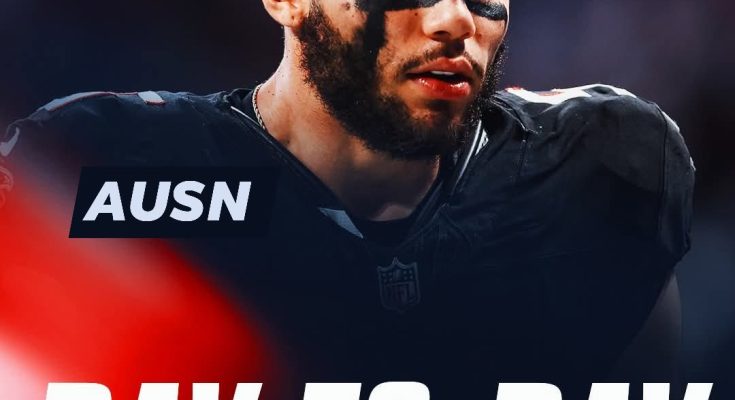Drake London, the wide receiver for the Atlanta Falcons, recently suffered a shoulder sprain during a game against the Tampa Bay Buccaneers. According to reliable sources like Ian Rapoport, a respected NFL insider, London’s injury is being treated with caution, and he is currently considered day-to-day. This means that while the injury isn’t severe enough to place him on injured reserve or rule him out for an extended period, the team and medical staff are closely monitoring his condition, and his availability for upcoming games will depend on how well he recovers.
A shoulder sprain is an injury that typically involves the stretching or tearing of ligaments in the shoulder joint. For a wide receiver like London, who relies heavily on upper-body strength, flexibility, and the ability to make precise catches, this kind of injury can be particularly challenging. The shoulder joint plays a crucial role in every aspect of a receiver’s game, from reaching out to make difficult catches to maintaining balance and shielding the ball from defenders. The recovery process can vary depending on the severity of the sprain. Minor sprains may heal within a week or two with rest and physical therapy, while more significant ligament damage could require more intensive treatment and longer downtime.
London being ruled out earlier Sunday before further testing suggests that the Falcons’ medical team is exercising due diligence in evaluating the injury’s extent. It’s a common practice in the NFL to initially sideline a player if there is uncertainty about the injury’s severity, to avoid risking further damage. Further testing could involve imaging techniques such as an MRI or ultrasound, which provide a detailed look at the soft tissues around the shoulder. This helps doctors determine if there is any ligament tearing, muscle strain, or other complications that could influence the treatment plan.
Drake London has been a key player for the Falcons. As a young wide receiver with a promising career ahead, his health is critical not only for his personal development but also for the Falcons’ offensive strategy. The team’s passing game depends on his ability to create separation from defenders and make big plays. His injury could force the Falcons to adjust their game plans, relying more on other receivers or altering their play-calling to compensate for his potential absence or limited mobility.
From a broader perspective, injuries like London’s highlight the physical toll that professional football takes on athletes. The NFL season is grueling, with players facing high-impact collisions week after week. Even players in skill positions, who might not be engaging in constant blocking or tackling, are vulnerable to injuries due to the dynamic and physical nature of the sport. Teams invest heavily in medical staff, trainers, and recovery technologies to minimize downtime and help players return to the field as quickly and safely as possible.
The Falcons’ medical team will likely develop a recovery plan tailored to London’s needs, which might include rest, physical therapy, and gradually increasing activity levels. They might also employ modern treatments such as ultrasound therapy or platelet-rich plasma injections to promote healing. Monitoring will continue throughout the week, and decisions about his game-day status will be made based on his progress and any pain or limitations he experiences.
Meanwhile, the Falcons’ coaching staff will need to prepare for multiple scenarios. If London is able to return quickly, he could resume his role in the offense without much disruption. However, if his recovery takes longer, the team might need to give more playing time to backup receivers or consider changes to their offensive scheme to reduce reliance on deep or contested catches that could exacerbate London’s injury.
For fans, the uncertainty around London’s injury can be nerve-wracking. He has been one of the more exciting young talents on the Falcons roster, showing potential to be a reliable and dynamic playmaker. His ability to stretch the field and create scoring opportunities is valuable, and losing him, even temporarily, would be a setback. At the same time, the NFL is a league where depth and adaptability are key, and teams must be ready to overcome injuries through strategic adjustments and contributions from the entire roster.
From a player’s perspective, recovering from a shoulder sprain involves not only physical healing but also mental preparation. Players often face challenges such as fear of re-injury or frustration from being sidelined. Mental resilience, support from teammates, coaches, and medical staff, and adherence to rehab protocols are crucial components of a successful return.
Drake London’s injury also underscores the importance of ongoing player health and safety initiatives in the NFL. The league has made strides in recent years to improve protocols for injury assessment and management, emphasizing player well-being over immediate game outcomes. The “day-to-day” designation reflects this cautious approach, allowing players time to heal and reducing the risk of exacerbating injuries by rushing back too soon.
Looking forward, the Falcons will closely monitor London’s response to treatment and adjust their plans accordingly. If the tests reveal only a mild sprain, he might be able to participate in practice within a few days and be available for the next game. If the injury is more serious, a longer recovery period will be necessary. Either way, the team’s medical and coaching staffs will communicate transparently with the public to keep fans informed about London’s status.
In the context of the NFL season, injuries are an inevitable part of the game, but how teams manage them can significantly influence their success. Maintaining player health while staying competitive requires a delicate balance. The Falcons’ handling of London’s injury situation will be closely watched by analysts and fans alike, as it provides insight into the team’s resilience and depth.
Overall, Drake London’s shoulder sprain is a setback, but with modern medical care, supportive team infrastructure, and his own determination, there is every reason to be optimistic about his recovery. His health will be a priority for the Falcons as they aim to keep their offense effective and maintain momentum in what is always a challenging and demanding NFL season. The next few days of testing and observation will be critical in shaping the path forward for London and the Falcons.



